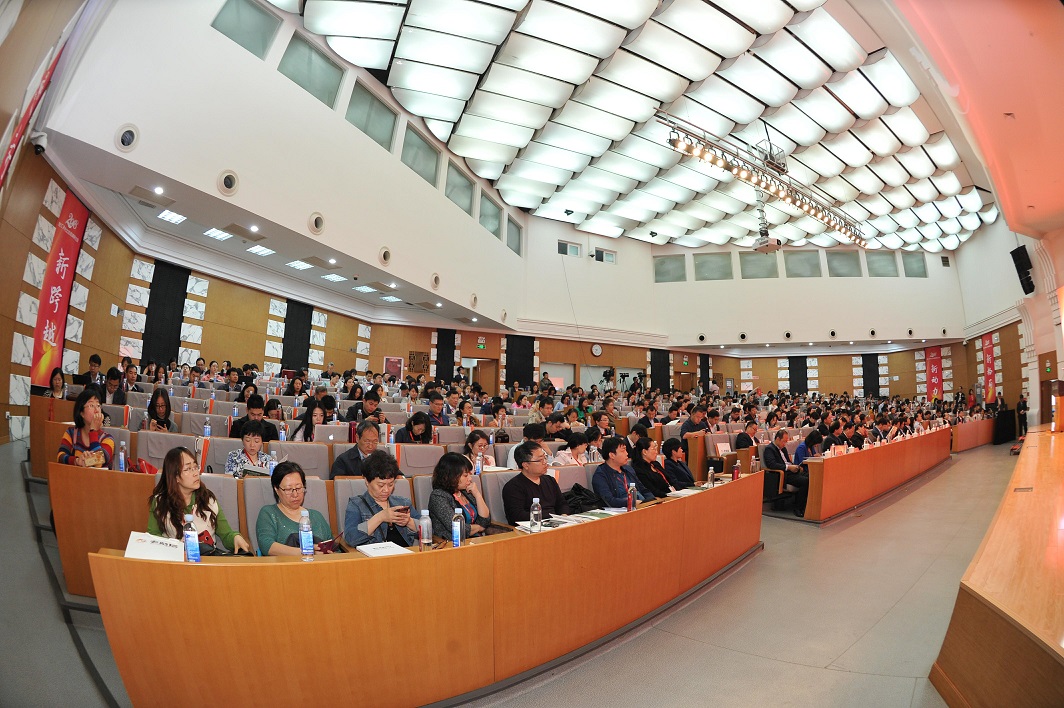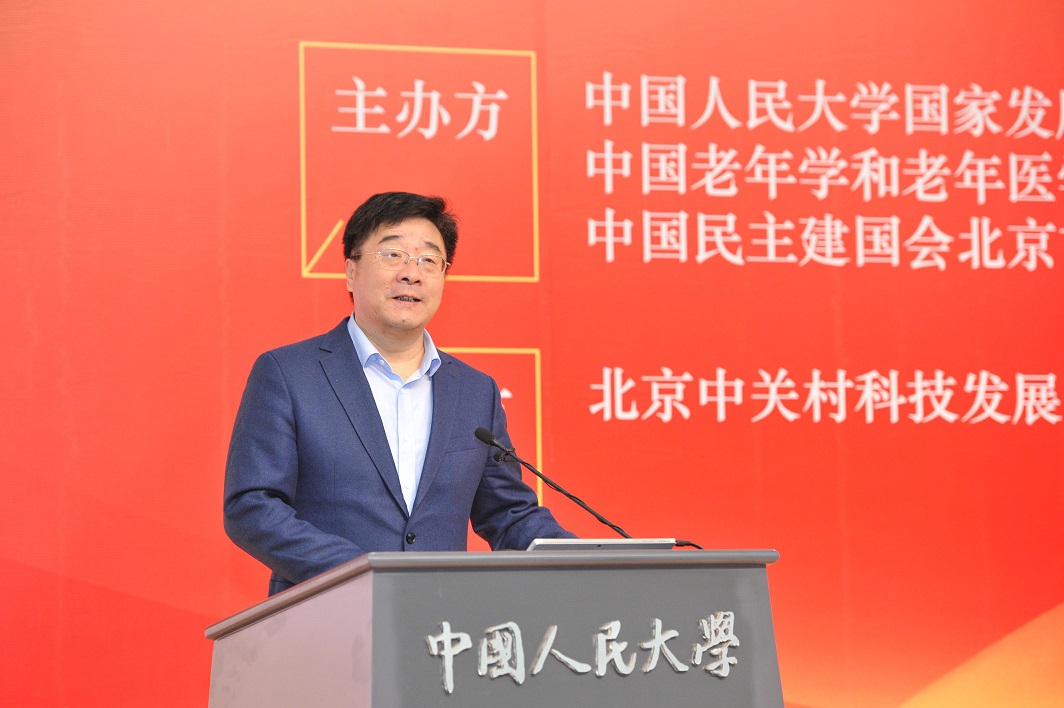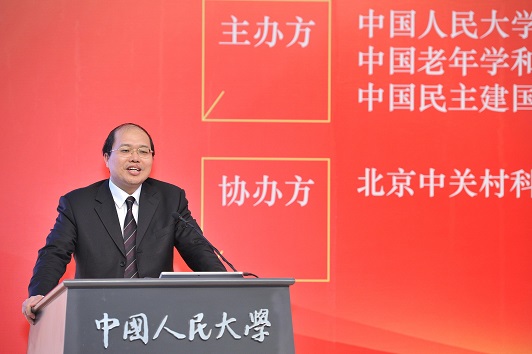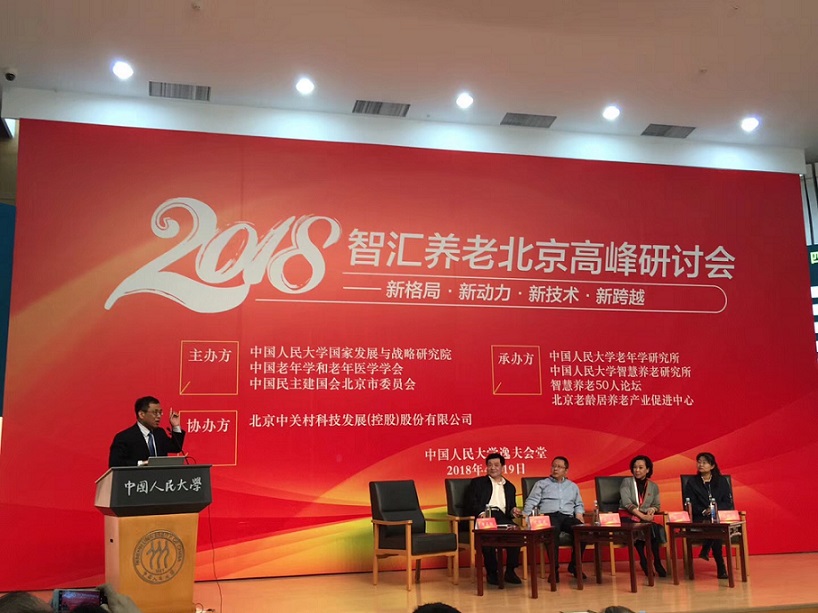 Research Update
Research Update
27
AprilOn April 19, the 2018 Zhihui Beijing Aged Care Summit was held in the Renmin University of China (RUC). Nearly one hundred experts and scholars from government, colleges and universities, non-governmental think tanks and enterprises gathered to share ideological achievements of and presented a variety of constructive schemes for the new pattern, new power, new technology and new leap of the aged care undertaking in the new era.

Attendees included Chen Xiqing, Former Minister of the United Front Work Department of CPC Central Committee; Liu Wei, President of RUC and Dean of National Academy of Development and Strategy (NADS), RUC; Yan Zhongqiu, Vice Chairman of the 12th Beijing Municipal Committee of the CPPCC; Wu Yushao, Member of Leading Party Group and Vice Dean of Office of China National Committee on Aging (CNCA); Liu Weilin, President of China Association of Gerontology and Geriatrics (CAGG); and Yan Mancheng, Chairman of Social and Legal Affairs Committee of Beijing Municipal Committee of the CPPCC. Research Fellow Huang Shisong of NADS presided over the opening ceremony.

Liu Wei pointed out in his address that population aging is a pervasive problem in the world, and China is also entering into an aging society. With the time-honored tradition of “offering advices to government”, RUC has a high theoretical level and scientific resource advantages in such disciplines as gerontology, and is confident of contributing wisdom for the development of aged care and providing policy suggestions and intellectual support to competent government departments while pushing ahead the organic connection of government, industry, university and research and providing consulting, research and judgment services to entrepreneurs and investors.
Liu Weilin, President of CAGG, said that while China is confronted with both the aging of population and the small-sized, aging, empty-nest and non-functional development of families and families are increasingly less capable of aged care, the need for community-based aged care service is growing rapidly, which forces the socialized, professional and intelligent development of aged care. As a result, achieving another leap in aged care undertaking and industry will become an important task in the era of population aging. This summit corresponds to the development needs, and provides intellectual support for coping with aging positively.
Ren Xueliang, Executive Vice Chairman of Beijing Municipal Committee of China National Democratic Construction Association (CNDCA), said in the new era of socialism with Chinese characteristics, CNDCA Beijing Municipal Committee will gather consensuses, wisdom and forces for the capital’s aged care development by always focusing on the leading edge of the capital’s economic and social development, highlighting aged care and other important and difficult issues, proactively probing into the construction of new-type specialized think tanks using its advantages and characteristics, and appropriately utilizing the democratic forms and institutional channels for negotiation between CPC and other political parties.
Wen Yan, Member of the Economic Committee of Beijing Municipal Committee of CNDCA presided over the keynote speech at the main venue in the morning.
Wu Yushao, Member of Leading Party Group and Vice Dean of Office of CNCA and Vice President of China Association for Aged People (CAAP) proposed that the education of population aging is of great guiding significance in China. Universal education should be highlighted in the content and mode of education, with particular emphasis on the education of three key groups: cadres of Party and government, adolescents and the aged, and the social atmosphere of healthy and positive aging and the view of population aging education should be formed across the society over time.
Li Hongbing, Vice Director and Spokesperson of Beijing Municipal Civil Affairs Bureau, expounded the keywords of current practice of aged care and basic trends in future. In his opinion, the government of Beijing Municipality should realize decrement and better efficiency at the same time through multiple integration and form solid social insurance support by planning as a whole three basic content—social supply, personnel guarantee and insurance in the process of building a systematic thinking-based and organically integrated aged care service system.
As China is faced with complicated problems of urbanization and population aging, we should achieve another leap by drawing new power and using new techniques, Huang Shisong said. First, we should stick to the combination of leadership of Party committees, government guidance, social participation and all-people action. Second, we should establish an aged care service system that is based on homes, relies on communicates, is supplemented by organizations, combines medical resources and aged care resources, and covers both urban and rural areas. Third, we should plan as a whole the development of the aged care undertaking and the aging industry, and open up the aged care service market that features joint development, joint governance and sharing. To respond to the mid- and long-term aging of population, we should deal with five relations—(1) the organic connection with the overall urban planning of Beijing; (2) the organic connection with the coordinated development of Beijing, Tianjin and Hebei; (3) the organic connection with undertaking and industry; (4) the organic connection with administrative management system and social participation; and (5) the legislation of aged care work.

Zuo Meiyun, Director of the Institute of Smart Senior Care, RUC, said that attempts should be made, in the initial stage of the “Internet+ aged care” development, in five aspects: first, the Leading Group of Data Management and Informatization for Aged Care should be established to evaluate the Internet+ aged care development index of all organizations; second, we should issue an aged care card consumption promotion plan, and cultivate the aged care industry; third, we should build the aged care service atmosphere by selecting pilot districts and advanced sub-districts of “Internet+ aged care”; fourth, we should improve aged care work by holding “Internet+ aged care” trainings; last, we should create new practice forms by holding the practical short video competition for elderly health management and home care.

Li Bin, Vice President of Beijing Centergate Technologies (Holding) Co., Ltd., deems the aged care industry in China features, at macroscopic level, “preferential policies and capital input”. Its business selection tends to be diversified. Seen from business development strategy, most listed companies have chosen the strategy of diversification, in which, however, aged care service takes up a small share. On the whole, the Chinese aged care market stays in the initial stage of growth, and its business pattern is to be deepened and expanded. But the aged care industry is about to meet its good period, and sensitive enterprises with strong capital capabilities are making arrangements.
Subsequently, forums with the themes of “new power under the new pattern” and “application of new techniques under the new pattern” were held, and they were presided over by Huang Shisong, Research Fellow of NADS, and Fang Deying, Vice President of Beijing Technology and Business University (BTBU) and Vice Dean of Economic Committee of Beijing Municipal Committee of CNDCA respectively. Many specialists from government, enterprises and research organizations shared and exchanged the attempts and studies in their respective field.


This summit was organized jointly by RUC-NADS, CAGG and CNDCA Beijing Municipal Committee. It aims to push ahead the combination of government, industry, university, research and application by fully utilizing the intellectual resources of high-end national think tanks, the advantages of multi-party cooperation and political consultation with Chinese characteristics and the guidance of state-level organizations, form a variety of ideological outputs, provide intellectual support to relevant government departments and at the same time, guide the development of aged care undertaking and industry. Present at the summit were more than 400 people, including those from State Information Center (SIC), Board of Supervisors for Key Large-Sized State-Owned Enterprises, Reform Office of CPC Beijing Municipal Committee, Beijing Municipal Committee of Social Work, Beijing Municipal Civil Affairs Bureau, Office of Beijing Municipal Committee on Aging, Beijing Municipal Bureau of Retired Veteran Cadres and other committees, offices and bureaus, and some teachers and students from RUC.